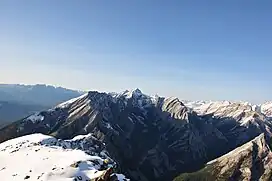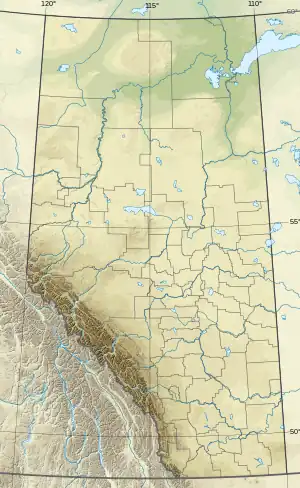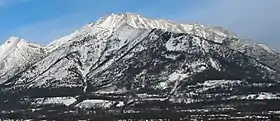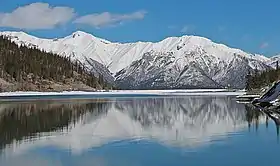| Mount Lady Macdonald | |
|---|---|
 Mount Lady Macdonald from Grotto Mountain (minor summit), October 2009 | |
| Highest point | |
| Elevation | 2,606 m (8,550 ft)[1] |
| Prominence | 75 m (246 ft)[2] |
| Parent peak | Mount Charles Stewart (2809 m)[2] |
| Listing | Mountains of Alberta |
| Coordinates | 51°07′17″N 115°19′04″W / 51.12139°N 115.31778°W[2] |
| Geography | |
 Mount Lady Macdonald | |
| Country | Canada |
| Province | Alberta |
| Protected area | Bow Valley Provincial Park |
| Parent range | Fairholme Range |
| Topo map | NTS 82O3 Canmore[3] |
| Climbing | |
| First ascent | 1886 by J.J. McArthur[2][1] |
| Easiest route | Scramble (difficult)[3] |


Mount Lady Macdonald is a mountain located within Bow Valley Provincial Park in the Bow River valley at the town of Canmore, which is located just east of Banff National Park, Alberta, Canada.
The mountain was named in 1886 after Susan Agnes Macdonald, wife of Sir John A. Macdonald, the first Prime Minister of Canada. The Macdonalds travelled on the new national railway through the Canadian Rockies in 1886 on their way to Vancouver.[3][2][1]
Hikers may hike a trail that begins in Cougar Creek and continues to a helipad just short of the knife's edge ridge that leads to the top of the mountain.
Geology
It is composed of sedimentary rock laid down from the Precambrian to Jurassic periods.[4] Formed in shallow seas, this sedimentary rock was pushed east and over the top of younger rock during the Laramide orogeny.[5]
Climate
Based on the Köppen climate classification, it is located in a subarctic climate with cold, snowy winters, and mild summers.[6] Temperatures can drop below -20 C with wind chill factors below -30 C. Weather conditions during summer months are optimum for climbing.
See also
References
- 1 2 3 "Mount Lady Macdonald". cdnrockiesdatabases.ca. Retrieved 2007-08-31.
- 1 2 3 4 5 "Mount Lady Macdonald". Bivouac.com. Retrieved 2021-07-21.
- 1 2 3 Kane, Alan (2016). "Mount Lady Macdonald". Scrambles in the Canadian Rockies (3rd ed.). Calgary: Rocky Mountain Books. Kindle Edition. ISBN 978-1-77160-098-9.
- ↑ Belyea, Helen R. (1960). The Story of the Mountains in Banff National Park (PDF). parkscanadahistory.com (Report). Ottawa: Geological Survey of Canada. Archived (PDF) from the original on 2015-10-02. Retrieved 2019-09-13.
- ↑ Gadd, Ben (2008), Geology of the Rocky Mountains and Columbias
- ↑ Peel, M. C.; Finlayson, B. L. & McMahon, T. A. (2007). "Updated world map of the Köppen−Geiger climate classification". Hydrol. Earth Syst. Sci. 11: 1633–1644. ISSN 1027-5606.
External links
 Media related to Mount Lady McDonald at Wikimedia Commons
Media related to Mount Lady McDonald at Wikimedia Commons